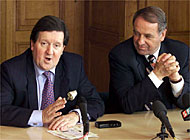
Nato chief stresses need for greater international cooperation

The Swiss president, Adolf Ogi, and Nato's secretary general, George Robertson, have spoken of the need for Switzerland to play a bigger role in the international arena.
The two men were speaking at a symposium in Berne, during an official visit by the Nato chief.
They later gave a press conference in Switzerland’s capital, where Ogi stressed that Nato was Switzerland’s partner, and that his talks with Robertson did not touch on the issue of Swiss membership of the alliance.
At the symposium, Ogi said the world was “becoming progressively smaller”, and that countries had to work together to preserve their common security. He added that, with the end of the Cold War, the goal of a free and democratic Europe “was today a realistic goal”.
His words were echoed by Robertson, who spoke of the need for countries to be more engaged in conflict prevention and peacekeeping. He added that engagement had to take place on political, economic and military levels.
Robertson used the occasion to thank Switzerland for its involvement in Kosovo, and for participating in Nato’s Partnership for Peace (PfP) programme, which was created to encourage non-Nato members in Europe to participate in some of its activities.
Switzerland joined the PfP in December 1996 and has a contingent of unarmed troops operating in the Nato-led force in Kosovo. On Wednesday, the government agreed to extend the Swiss troops’ mandate in the province by another year.
Robertson said the conflicts in the Balkans highlighted the importance of security in Europe. He said they illustrated that states in the modern world could no longer simply react to crises, but needed to take steps to prevent them from occurring in the first place.
Ogi stated that Switzerland was not considering steps to join Nato, but that Robertson’s visit was aimed at solidifying ties with the organisation: “We met today in order to strengthen the partnership, and not to negotiate any membership. We do not intend to join the Nato defence alliance,” Ogi said.
Robertson also endorsed proposals for a slimmed-down, more professional Swiss army. He said that as a nation’s security threats change, so their defence needs change.
“The professionalisation of armed forces is critically important. In most of the crisis situations that we are likely to face, soldiers must be well trained in a wide range of skills to allow them to deal with the problems that they can confront and to survive in sometimes difficult and hostile situations.
“Fewer soldiers, better trained soldiers, more mobile, more deployable soldiers, is the nature of the modern armed forces to face tomorrow’s problems,” Robertson said.
The former Russian prime minister, Viktor Chernomyrdin, who criticised Nato for its involvement in Kosovo, also addressed the symposium. He said the alliance had failed to solve any of the problems facing the province.
The German defence minister, Rudolf Scharping, who also spoke, countered that “the crime rate in Kosovo was lower than in Moscow”.
swissinfo with agencies

In compliance with the JTI standards
More: SWI swissinfo.ch certified by the Journalism Trust Initiative

























You can find an overview of ongoing debates with our journalists here . Please join us!
If you want to start a conversation about a topic raised in this article or want to report factual errors, email us at english@swissinfo.ch.